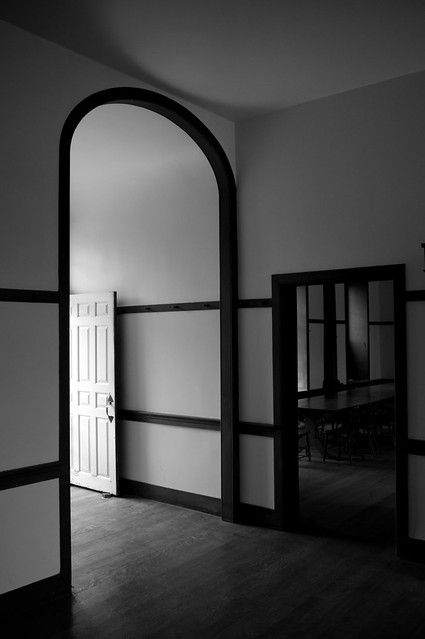Once a month, an old friend and I spend a day together with one goal in mind, to share the day talking and practicing photography. Each month, we alternate who is responsible for planning and making arrangements. May was my turn and I knew exactly where I wanted to bring my friend, Jim.
Three hours south of my home is a historic village settled by a religious sect called the Shakers. They are famous for their industrious work ethic, quality craftsmanship, simple design sensibility, and their religious life. Though there are only a handful of shakers left, their impact on culture and design have been enormous.
Shaker design is famous for its simplicity. Straight lines and gentle curves are featured in the furniture, buildings, and products that they make.
Shaker homes are orderly. Every item has a place and when not in use, needs to be stored away. Their buildings were kept spotless.
Everything must have a purpose. If the shakers could not find a basic use for any object, they had no use for it. This is not to say that the shakers did not enjoy beauty. Everything they made had beauty. However, they did not create art just for art's sake. Instead, the shakers took everyday utilitarian objects and made them beautiful.
The Shakers lived in large communal homes that were filled with open space and light. Every exterior wall is filled with large windows that let light stream into the room. The light leads you through their buildings from one room to another.
Shakers believe in gender equality, however they do not believe in procreating. Men and women are strictly segregated, each having their own building entrances and stairwells. The sect maintained its numbers through adoption, volunteers and in the early years, indenture.
However, as time passed by, the Shaker's belief in no-procreation meant that their congregations could not be sustained. Today, with very few remaining, the Shakers are only remembered for the beauty that they created and left behind.
The Shaker village at Pleasant Hill Kentucky is one of the few locations where you can see their legacy. The farm remains active, though now it is primarily staffed by volunteers. The living history museum gives you the opportunity to experience the world of simple beauty created by the Shakers.
The Shakers believe that making something well is like a prayer to God. Though I am not a religious person, I can easily see how the Shakers could see God in the beauty and light that made up their homes, their furniture design and in their simple lifestyles.








